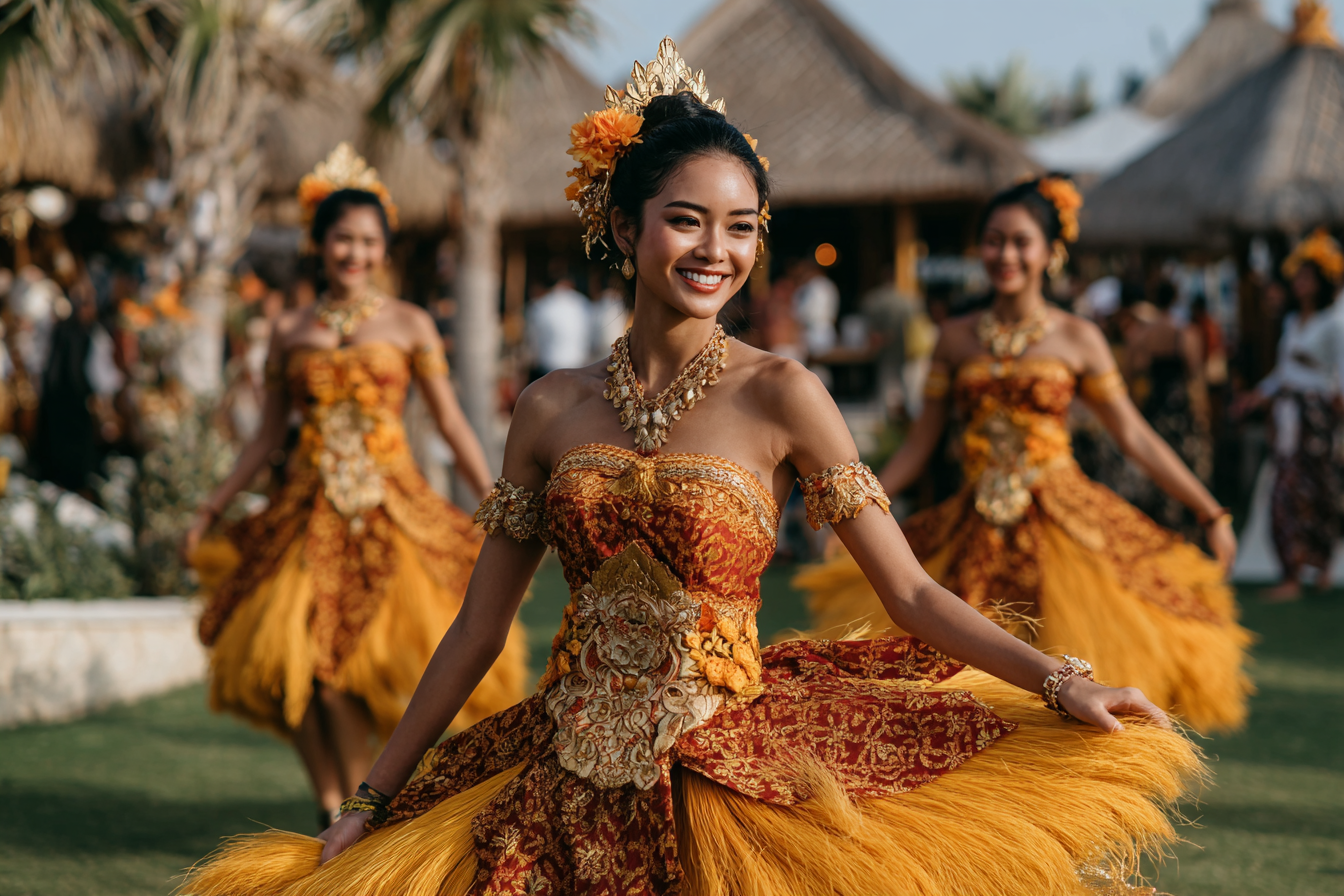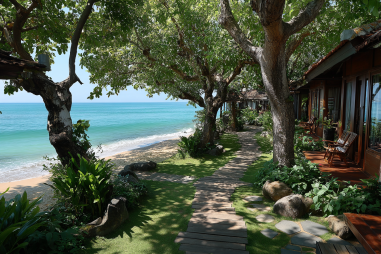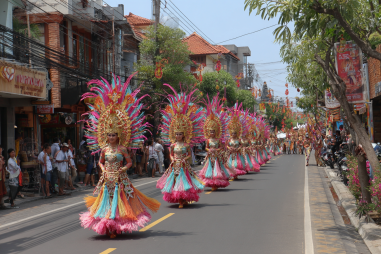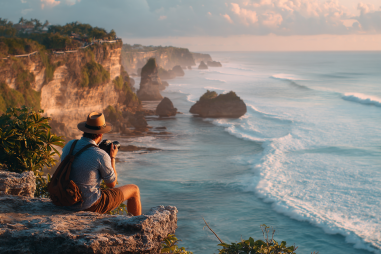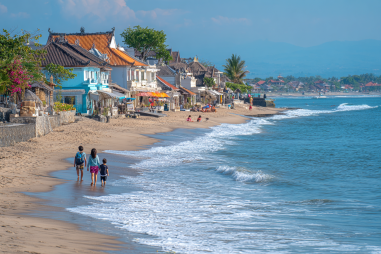Canggu, a vibrant coastal town on the southern coast of Bali, Indonesia, has grown immensely popular in recent years as a destination for surfers, digital nomads, and culture seekers alike. Yet beneath its trendy cafes and bustling streets lies a rich tapestry of local culture that offers visitors a chance to connect deeply with the heritage and traditions of the Balinese people. Understanding Canggu’s local culture isn’t just about observing its scenic beauty — it’s about appreciating the spiritual practices, festivals, daily customs, and artistic expressions that shape the community’s identity. Let’s explore what makes Canggu’s culture truly unique and how you can experience it respectfully.
Balinese Hinduism and Rituals
At the heart of Canggu’s local culture lies Balinese Hinduism, a unique form of Hindu practice that blends influences from ancient indigenous beliefs, Hindu traditions from India, and local animist practices. The Balinese are deeply spiritual people, and daily rituals are an intrinsic part of their lives. Most homes and businesses in Canggu feature small family shrines where offerings known as canang sari are placed every morning. These offerings, made from palm leaves, flowers, rice, and incense, express gratitude and seek protection from the gods.
Religious ceremonies and rituals frequently occur at temples throughout Canggu, each dedicated to different deities. These events are communal, often involving prayers, chants, and symbolic purification ceremonies. Visitors might find themselves witnessing colorful processions or participating in temple blessings, offering a glimpse into the spiritual rhythms that guide life in Canggu.
Festivals and Cultural Celebrations
Canggu, like the rest of Bali, is home to a calendar full of vibrant festivals that celebrate religious devotion, nature, and community. One of the most significant is Galungan, a festival that celebrates the victory of dharma (good) over adharma (evil). During Galungan, the streets and temples are decorated with intricate bamboo poles called penjor, and families invite neighbors to partake in feasts and ceremonies.
Another important celebration is Nyepi, the Balinese Day of Silence, which marks the Balinese New Year. On this day, Canggu goes quiet as locals observe a day of fasting, meditation, and complete silence. No vehicles travel, and even tourists are encouraged to respect the tranquility and stay indoors.
These festivals not only reinforce spiritual beliefs but also strengthen social bonds, making them a special time to witness the communal spirit that defines Canggu’s culture.
Daily Life in Canggu Villages
Canggu’s charm largely comes from its traditional village life, where agriculture and close-knit communities thrive alongside the influx of tourism. Rice fields paint the landscape with vibrant green hues, and farming remains a primary livelihood alongside artisanal crafting. Many locals live in simple family compounds, where multiple generations share space, maintain ancestral customs, and uphold family values.
Daily life here is marked by a strong sense of community and rhythm; mornings may begin with collective prayers or temple visits, while afternoons involve tending to rice paddies or socializing in communal spaces. Even as modernity has introduced cafes, surf shops, and co-working spaces, many residents maintain their cultural practices, blending the old and new seamlessly.
Art, Music, and Dance
Artistic expression is prolific in Canggu, reflecting both religious devotion and contemporary creativity. Traditional Balinese dance performances, such as the Legong or Barong, tell age-old myths through graceful, highly stylized movements and are often held at temple festivals or cultural centers. Attend one of these performances to understand the spiritual symbolism embedded in every gesture and costume.
Balinese gamelan music, consisting of bronze percussion instruments such as gongs and metallophones, is another cultural highlight. Its hypnotic rhythms accompany dances and rituals, creating an immersive sensory experience. Local artists also produce vivid paintings, woodcarvings, and textiles that depict religious stories and everyday life, which visitors can appreciate in galleries or as souvenirs.
Local Crafts and Traditions
The craftsmanship of Canggu’s residents offers a tangible link to tradition. Skilled artisans create offerings, ceremonial masks, and hand-woven fabrics that are central to religious and social events. For example, intricate palm leaf weaving is a daily practice that reflects both artistic skill and spiritual significance, as these items become part of ritual offerings.
Many workshops in the area teach traditional crafts such as batik fabric dyeing, silver jewelry making, and wood carving. For visitors, these crafts provide insight into the meticulous techniques passed down through generations and the cultural value these items hold.
How to Respectfully Experience Culture
Engaging with Canggu’s culture respectfully means being mindful of local customs and social norms. When visiting temples, dress modestly, covering shoulders and knees, and remove footwear before entering sacred spaces. Always seek permission before taking photographs, especially during ceremonies or when photographing individuals in traditional attire.
Showing respect means observing silence in certain rituals, refraining from touching religious objects, and understanding that locals are often performing these customs with deep meaning. Tourists can enrich their experience by asking questions with genuine curiosity and participating in cultural activities through local guides, who offer invaluable context and guidance.
Cultural Tours and Workshops
For those eager to dive deeper, cultural tours and workshops in Canggu provide immersive experiences that go beyond surface-level observation. Guided temple tours reveal the history, mythology, and religious significance of sacred sites. Cooking classes introduce travelers to the preparation of traditional Balinese dishes and the cultural symbolism behind ingredients and culinary methods.
Workshops on dance, music, or crafts allow visitors hands-on opportunities to learn ancient art forms. These experiences benefit both guests and the community, supporting local artisans and fostering cross-cultural understanding. Participating in these programs can transform your visit from sightseeing to genuine cultural exchange.
Food and Cultural Symbolism
Balinese cuisine is a reflection of the island’s cultural and natural environment, with many dishes served during religious ceremonies and community gatherings. Staples like nasi campur (mixed rice), babi guling (suckling pig), and lawar (seasoned meat and vegetable salad) provide not just nourishment but also connection to ancestral traditions and local agriculture.
Food plays a symbolic role during festivals and rituals; specific ingredients are chosen for their spiritual meanings, and meals are often prepared collectively. Sampling Balinese food in Canggu is thus a way to taste the local heritage and understand how culinary practices weave into everyday and ceremonial life.
Tips for Embracing Canggu’s Culture
To truly appreciate Canggu’s local culture, keep these tips in mind:
- Respect local customs and dress codes, especially when visiting religious sites.
- Be patient and observant during ceremonies—sometimes participation means quietly spectating.
- Support local businesses, artisans, and cultural tours that respect and preserve traditions.
- Learn a few words in Bahasa Indonesia or Balinese to show your respect and openness.
- Always ask before photographing people or sacred rituals to ensure consent and respect.
By approaching Canggu with an open heart and respectful attitude, visitors can connect authentically with the island’s spirit and the warmth of its community.
Immersing yourself in the local culture of Canggu offers an enriching journey into a world where spiritual devotion, community, and creativity thrive in harmony. As you explore the temples, join in celebrations, savor traditional foods, and interact with artisans, you’ll gain a deeper appreciation of the vibrant culture that shapes Canggu’s unique charm. This understanding not only enhances your travel experience but also honors and preserves the rich heritage that defines this enchanting part of Bali.

